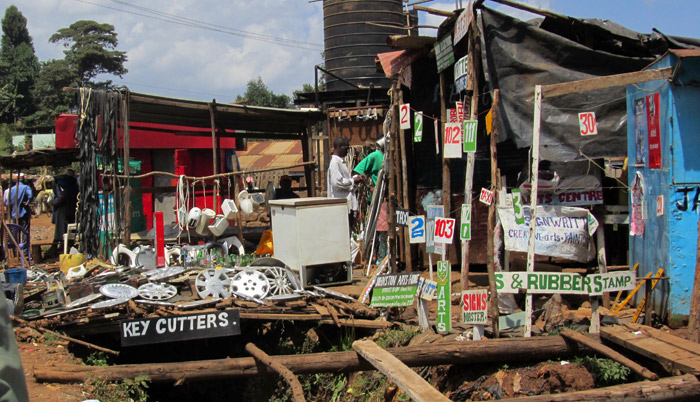Shortage of operating funds, raw materials, government regulation and the lack of skilled manpower continue to affect the growth of micro, small and medium establishments (MSMEs) in the country.
There are about 1.56 million licensed and 5.85 million unlicensed MSMEs employing 14.9 million persons currently but the majority close shop within five years of establishment due to the above problems.
According to a survey by the Kenya National Bureau of Statistics (KNBS), the distribution of closed establishments by age at closure shows 46 per cent fold in less than one year compared to 4 per cent which close at between 11 to 15 years.
Too few customers, personal reasons insecurity, huge business debt, competition and sickness were also other reasons the industry faced prompting many to close.
Last year alone 783,000 the segment closed down compared to 170,000 in 2011. The closure according to the report accounted for 35.4 per cent of the total number of closed establishments.
The survey reveals that 29.6 per cent of businesses closed down due to a shortage of operating funds caused by increased operating expenses, and declining income and losses from the operations.
The report also shows that 54.9 per cent of the businesses which closed down during the period were owned by women. “This may be explained by challenges of running businesses that are unique to women especially because of their social obligations in the society,” report notes.
How to get your Small Business started in Kenya
The survey results revealed that 46.3 per cent of the establishments were closed within the first year of operation. However, on average, it was observed that the age of establishments at closure was 3.8 years.
Further analysis of the report shows that 1.43 million enterprises which closed down in the last five years had been started or acquired during the same period.
In 2014 over 326,000 establishment which were started or acquired in the same year closed their operations.
“Establishments started or acquired and closed in the last five years were mainly in the wholesale and retail trade; repairs of motor vehicle and motorcycles and accommodation and food service activities which jointly accounted 85.9 per cent of the total establishments,” the report shows.
Most of the closed businesses were in wholesale and retail trade; the repair of motor vehicle and motorcycles sector accounted for 68.5 per cent of the total closures. “Establishments that were started or acquired within the last two years were more vulnerable to closures and they accounted for 61.3 per cent of the total businesses closed,” the report notes.
Only 8.8 per cent of the total establishments closed were aged 11 years and above. Businesses in the arts, entertainment and recreation sector had the highest average life of 10.1 years.
A significant proportion of business owners, 33.5 per cent, reported that they were not engaged in any economic activity after closing their establishments, 22.8 per cent started other businesses while 28.5 per cent went to work for someone else.
Best Facebook marketing groups for small businesses
The report further shows a high number of undocumented businesses after it found that of 7.4 million MSMEs- 1.5 million of these businesses are licensed by the 47 county governments and about 5.9 million are unlicensed.
The majority of both licensed and unlicensed establishments are concentrated in Nairobi City County, followed by Nakuru and Kakamega counties.
Among licensed establishments, 16.6 per cent indicated that they would overcome some constraints if they were assisted in market promotions.
Other proposed solutions of 15.4 per cent and 14.9 per cent were relaxing licensing requirements and providing an enabling environment for fair competition.
Only a small proportion were concerned with water supply, access to land, political disturbances, technological changes, providing access to public tender and reviewing laws of land tenure and tenancy.
Of concern to the small businesses was high interest rates and denial of loans by commercial banks and microfinance institutions.
“MSME financing framework is weak and may work against acceleration and support for business growth,” the report notes.
About 84 per cent and 18 per cent of unlicensed and licensed establishments, respectively, were found to be worth Sh 50,000 and below.
On the other hand, about 16.3 per cent of licensed establishments were worth over Sh1 million whereas no unlicensed businesses registered a net worth of more than Sh1 million.
“As such, the MSME sector, therefore, arguably provides the highest employment opportunities in Kenya. Overall, the MSME sector makes key contributions towards improving the economic and social sectors of the country through nurturing large-scale employment across the country.
The report notes that lack of adequate infrastructure has been cited as a major constraint faced by MSMEs in Kenya.
Access to amenities such as transport systems, electricity, and water, telephone and internet connectivity will enhance the competitive advantage amongst entrepreneurs.
The report has asked the banks to reduce reliance on collateral funding to allow MSMEs to access loans to expand their businesses.
The survey, conducted by the Kenya National Bureau of Statistics (KNBS), is the first of its kind on the continent and is supposed to provide comprehensive data at national and county levels on the characteristics, operations, dynamics and evolving nature of MSMEs.

